
If you’re looking to take profits or free up some cash, then this review will help you establish why and how to sell Bitcoin.
- What is Bitcoin?
- How has Bitcoin traded since 2009?
- What are the challenges facing Bitcoin?
- How to sell cryptocurrency
- Final thoughts
What is Bitcoin?
Bitcoin is the original cryptocurrency. For many, Bitcoin and crypto are the same things, and while that’s the case, enthusiasm for cryptos translates as bull runs in the price of BTC.
Developed in mysterious circumstances in 2009, even the identity of its founder Satoshi Nakamoto is still debated. What is beyond debate is that early adopters and big-hitters who got in at the right time have made millions out of investments in BTC.
The complicated backstory of Bitcoin’s creation adds a little glamour to an idea that is, to some extent, relatively straightforward. Cryptos use blockchain processes and protocols. This involves those on the platform recording their holdings and transactions on an open ledger.
The transparency of open-ledger accounting means that everyone is aware of everyone else’s holdings – a simple idea, but one considered by many to be enough to revolutionise the modern financial system.

Other features of blockchain offer the chance for cryptos to free up global payments from the established vested interests such as central banks.
- Bitcoin, like other cryptos, is decentralised – there isn’t any controlling entity. Currency is released into the market in the form of coins in a rigid and pre-defined way. This removes the risk of the financial network being manipulated to suit political purposes.
- There is a degree of anonymity. While open-ledger reports detail where all the BTC on the Bitcoin platform is being held, it doesn’t divulge the holder's underlying identity.
The Bitcoin platform and the token used to carry out transactions on it, BTC, are the big story in the financial markets. However, not all stories have a happy ending. There are reasons to lead many to ask, should I sell my Bitcoin?
How has Bitcoin traded since 2009?
If the Bitcoin ‘Plan A’ pans out and BTC becomes the global currency of the future, then BTC's value would skyrocket as everybody would need to buy it to carry out financial transactions.
The below table of cryptocurrencies by market capitalisation shows how demand for BTC has driven up prices:

Source: Yahoo Finance
With about 21m BTC in circulation and coins currently trading at about $18,000, the market capitalisation of Bitcoin is in the region of $343bn. A reflection of the coin’s dominance is that its nearest rival, Ethereum, has a market cap closer to $70bn. In fact, BTC has a market cap greater than all the other top-10 cryptos combined.
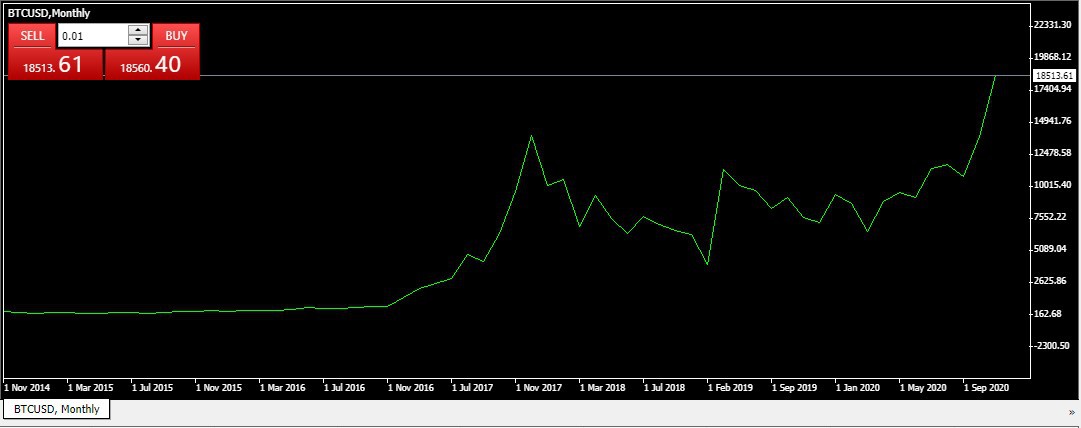
Source: Pepperstone
Popularity equates to buying pressure, and the price of BTC is currently at all-time highs. It is a volatile market, though, and the chart of 2017-18 outlines how fast price can move in the other direction.
BTC price chart, 17th July-18th September
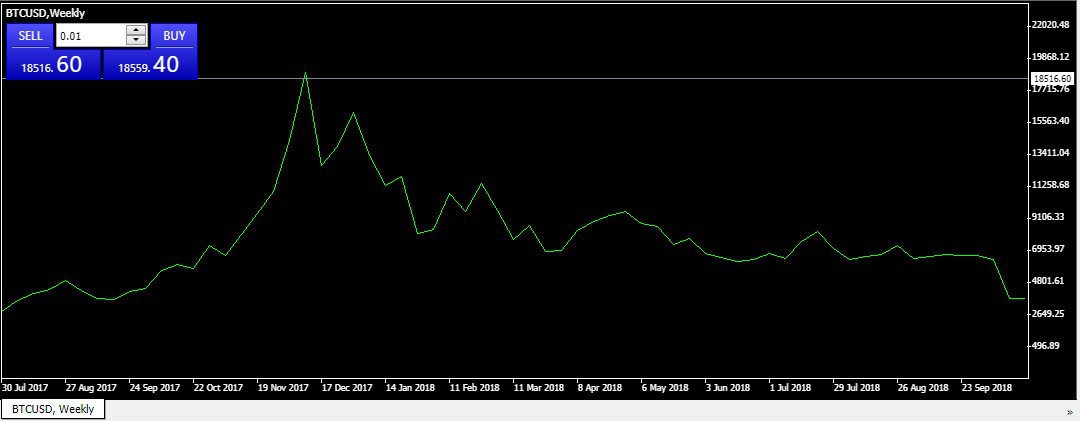
Source: Pepperstone
Bitcoin’s track record shows that in the space of just over 12 months, it lost 85% of its value – an eye-watering price drop for anyone who bought at the top. Price drops like this are what has led many to wonder, how do I sell my Bitcoin?
What are the challenges facing Bitcoin?
Bitcoin’s price rise throughout 2020 reflected its ability to act as a store of wealth. Many have piled into the crypto or even just bought some through fear of missing out. There are concerns though that it might not be an ideal candidate for acting as a means of exchange.
Payments between individuals and organisations on the Bitcoin platform are slow and expensive. This wasn’t such an issue back in 2009 because Bitcoin was the first and only crypto option. BTC's problem is that new disruptor coins, altcoins, have been developed to try to compete in terms of payments processing.
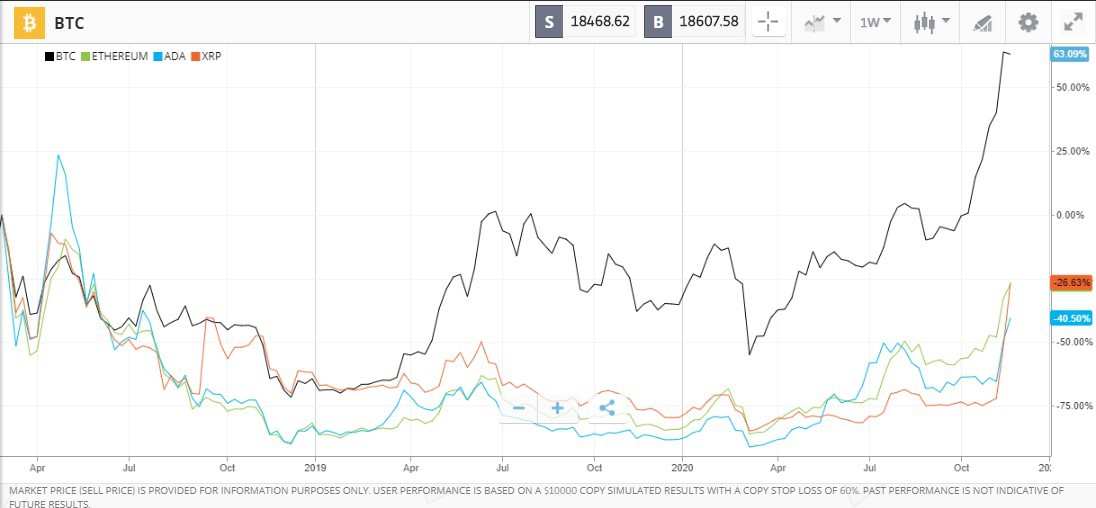
Source: eToro
The above price chart shows the price history of Bitcoin and some of its rivals. Ethereum, Ripple, and Cardano are second-generation coins developed to take the best bits of Bitcoin but not the weaker parts.
Payment processing times for these coins are a fraction of the 10 minutes it takes to process a BTC payment. They are also cheaper, with Ripple’s costs being so low that they are almost not worth measuring.
Bitcoin is still the dominant force in the market, but its weaknesses in some areas make it vulnerable to competition.
Even if Bitcoin does cement its position as the pre-eminent crypto, there is a range of obstacles posed by factors outside of the crypto world.
Vested interests such as governments, central banks, investment banks and even the general population stand to lose and gain from the global financial system being decentralised. With this in mind, there can be no certainty that any of the cryptos achieve their ultimate aim.
If you are looking to sell BTC – for example, you are UK-based and looking to sell Bitcoin for GBP – then timing is everything. Developing a clear strategy with entry and exit points is strongly recommended. To help with this, most brokers offer free research on Bitcoin and the crypto markets.
How to sell cryptocurrency
The decision to sell Bitcoin doesn’t necessarily require you to be already holding a position in it. If you want to, you can ‘sell short’ Bitcoin as part of a trading strategy. Those who do already own Bitcoin but are looking to sell have several options open to them.
Sell Bitcoin instantly
At one end of the spectrum are those looking to sell Bitcoin for cash. If you are looking to convert BTC as fast as you can and, for example, are wondering how to sell Bitcoin for GBP, then this link might help.
Using this map, it’s possible to locate the nearest Bitcoin ATM to you. These machines convert Bitcoin to GBP or whatever currency you want, making selling Bitcoin in the UK a potentially speedy process.
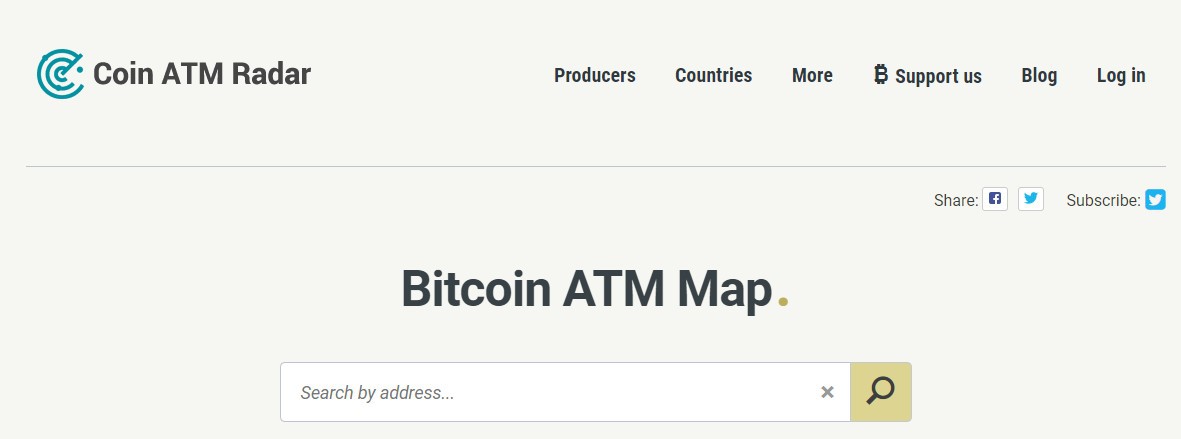
Source: Coin ATM Radar
The trade-off with Bitcoin ATMs mostly comes down to fees. They can take a hefty chunk of your total holding – rumours of 10% commission rates exist. For those who want to sell Bitcoin instantly, it can be a price worth paying.
Sell Bitcoin speculatively
The Bitcoin short-sellers, those who think that the price is just overcooked, can sell Bitcoin using an online broker that supports CFD (contract for difference) trading. If the price goes down after you take a short position, you make a profit. If it continues to rise, you make a loss.
Pairs trading – Bitcoin vs Ethereum
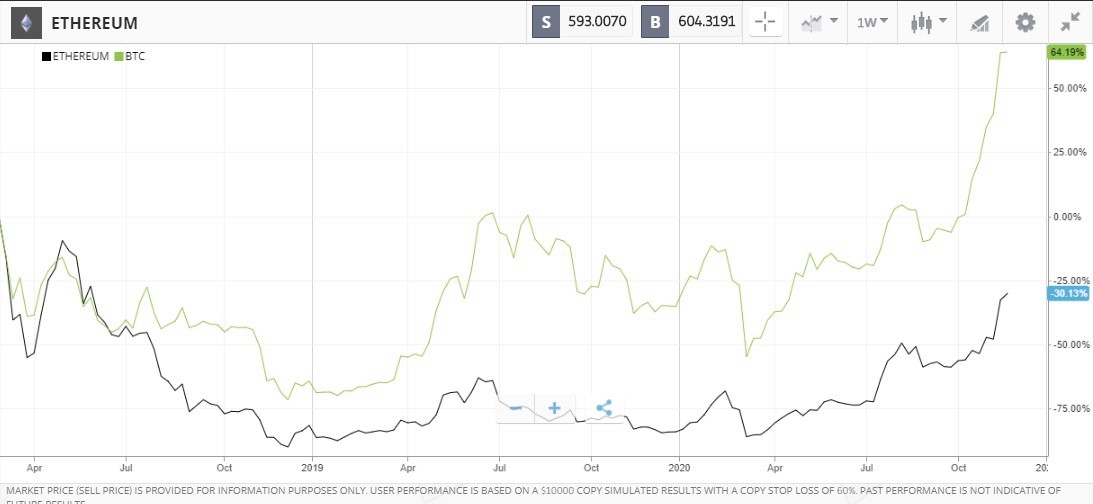
Source: eToro
Short selling is just the opposite of buying. The market risk applies to both strategies. However, short selling is seen as being higher risk as the price can technically rise to infinity, whereas long positions close out at zero.
The principle of pairs trading can also come into play. By buying an altcoin – for example, Ethereum – and selling Bitcoin, it’s possible to take a market neutral position that will turn a profit if the relative prices of the two coins go the way you want them to.
Low-cost ways to sell Bitcoin
One of the lowest-cost ways to sell Bitcoin is through an online broker. These brokers, which use CFDs, not only support short selling for speculators, but they also offer a regulated and cost-effective method to trade.
The potential downside of online brokers is that holding positions with them long term can see holding costs eat into profits. The other side of the coin is that they are designed to support cost-effective trading. Most accrue revenue via the bid-offer spread, so don’t charge extra commissions. The price you see is the price you’ll sell at.
If you follow this pathway to selling Bitcoin, then be sure to use a regulated broker. Look for one that operates under licence from a Tier-1 authority such as the Financial Conduct Authority (FCA), the Australian Securities and Investments Commission (ASIC), or the Cyprus Securities and Exchange Commission (CySEC).
How to sell Bitcoin at a specialist crypto exchange
Specialist crypto exchanges may not necessarily be the cheapest way to sell Bitcoin, but if you find a reputable and reliable one, it is a way to convert Bitcoin to cash.
The process of selling on an exchange works similarly to the process of buying there.
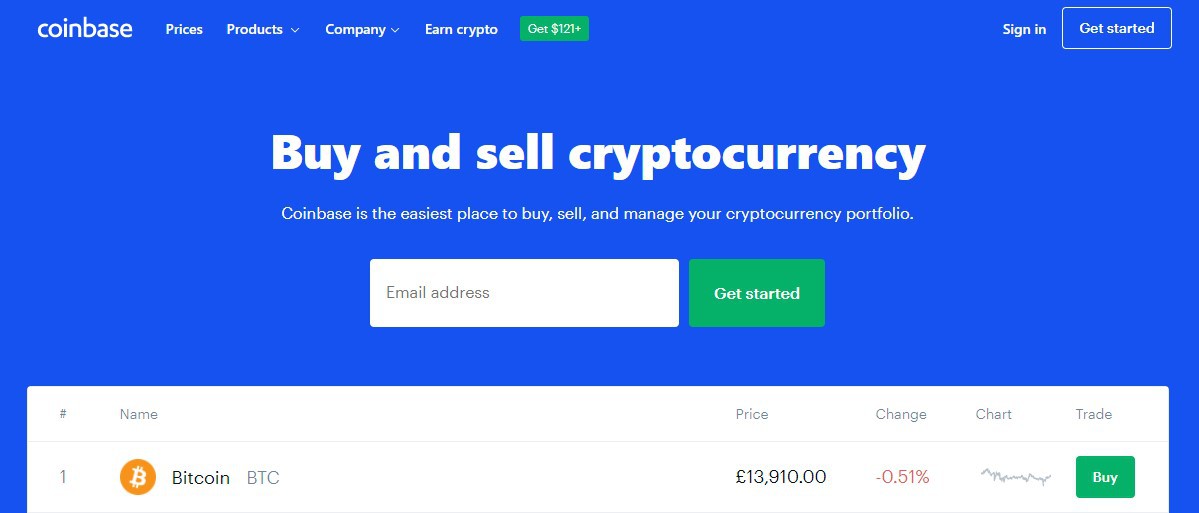
Source: Coinbase
Complete the onboarding process, check that your bank accepts fund transfers from that exchange, and then use the exchange to sell your Bitcoin and convert it to cash or, alternatively, into a different cryptocurrency.
Most exchanges leave it up to you to advise how much BTC you want to sell and at what price, and then confirm when the offer is taken up.
Final thoughts
Potentially the fastest and most cost-effective way of selling Bitcoin is to sell it directly to a friend or acquaintance. The trick here is finding a reliable counterparty with whom you can agree on a price.
A face-to-face transaction such as this is the acid test for cryptos as it represents individuals demonstrating trust in the transaction, even if it is quite manual. Such transactions do take place, confirming that fans of crypto might be on to something. Finding a buyer at the right time is the tricky part.
The alternative ways of selling Bitcoin have sprung up to cater to consumer demand. More and more people are buying and selling Bitcoin. All this activity does offer some hope for those holding onto their positions. If a payment system such as Bitcoin is going to be the currency of the future, then its value is borderline immeasurable.
